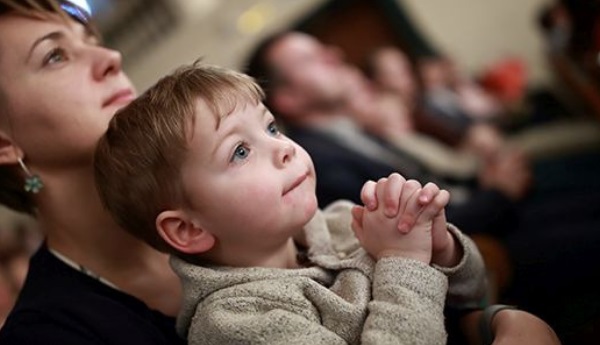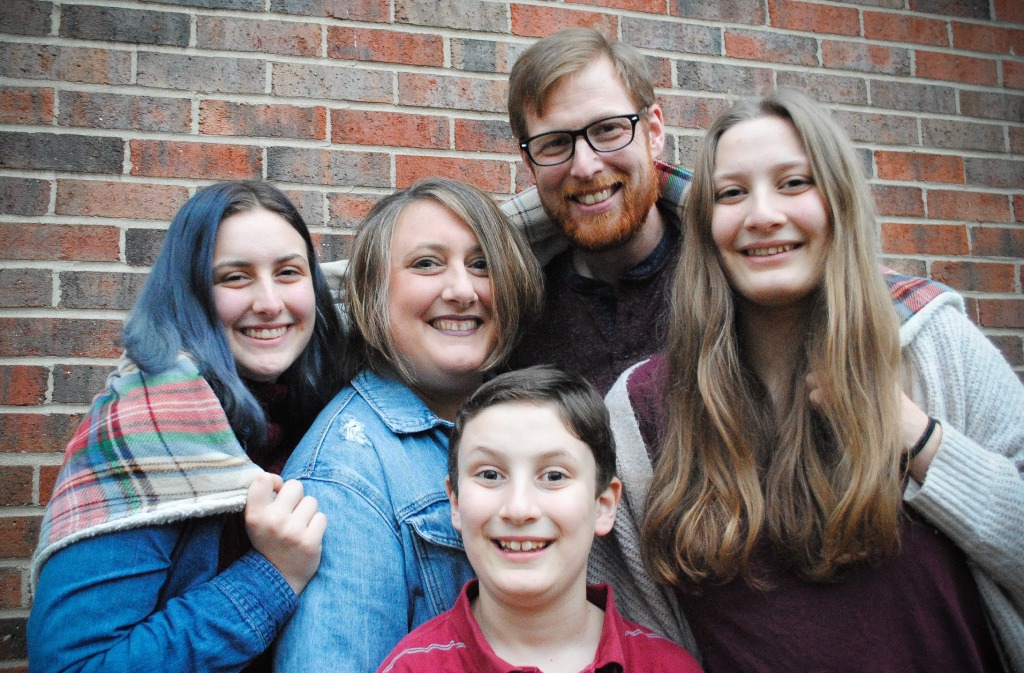In a church I once served in during the Sunday morning sermon, the pastor asked the congregation if they knew the fruits of the Spirit. The whole congregation started out strong but by the end, there was one group was still heartily reciting the fruit. That group? The kids. I couldn’t help but smile. I’m not sure how many others noticed, but the kids sure did. I had more than one come up to me afterwards and say something to the effect of “Miss Christina, did you hear us? We knew all the fruits!”
It was in that moment that I became aware of something I think is vitally important for us (and by us, I mean, adults in church) to grasp.
Kids in church doesn’t mean church for kids.
So many times I’ve heard concerns expressed that if children are brought into the larger church service, that service has to become all about the kids. But that’s actually opposite of the intention of bringing kids into the larger congregational environment. The heart behind including the children isn’t to make it all about them, but to invite them into the communal context, to let them experience corporate worship and participate in the liturgy as active members of the body.
HERE’S WHAT INTERGENERATIONAL WORSHIP IS NOT.
Glorified Sunday School (with adults invited)
One common concern expressed from those who are uncertain as to how to include children in worship is that the church service will turn into a child-centric Sunday school hour with parents and grandparents observing. It’s an understandable reaction because in many churches the only time children are in the worship service is for a special program or performance that is geared towards them or is starring them. If that’s the only experience the adults in church have had with children in corporate worship, it would be reasonable to feel concern over what will happen if the kids are there more frequently. But that’s not what intergenerational worship is.
“Big” Church
Another concern that is frequently shared is that kids are not mature enough to deal with certain themes that are found in Scripture. One video shared by a large, well-known church showed the pastor getting up to read the most provocative verses in Song of Solomon and a wide-eyed young man whose shocked mother puts her hands over his ears; the tag line reads, “Big Church is for Grown-ups.” Let’s be realistic – the vast majority of churches aren’t reading these few verses on a Sunday AND if they are, the pastor usually knows well in advance and can prepare parents for what will be shared.
Creating a worship service geared towards only one age group every Sunday limits the body of Christ and is never exampled for us in Scripture or in Jesus’ teachings.
To be clear, I am not opposed to age-appropriate ministry; there is a need for it and I am a strong advocate for children’s, youth, and various ages of adult ministry, but not to the exclusion of the including everyone in times of corporate worship.
Family Worship
Many churches host fabulous family worship events and experiences that encourage families to engage in discipleship, teaching, and worship experiences as a group. They are wonderful times for the family to grow together in Christ and with each other. However, most often these events are centered around the idea of family interacting and focusing on one another, worshipping as a unit and learning as a whole.
Intergenerational worship as a church body isn’t focused on the family but rather on the body of Christ as a whole. While families are together, they are not interacting with one another; rather they are joining their church family in worship and interacting with God and the body of Christ.
SO IF ALL OF THAT IT WHAT INTERGENERATIONAL WORSHIP IS NOT…THEN WHAT IS IT?
In his book, The Church of All Ages: Generations Worshiping Together, Howard Vanderwell states that intergenerational worship is “worship in which people of every age are understood to be equally important.” It’s where age fades into the distance and the focus becomes the body of Christ and all its parts. And it’s not easy. Fundamentally, all of these different age groups have different developmental needs. Each age understands differently, interacts differently, and learns differently. Each brings unique gifts, generational experiences, and certain expectations.
So, how do you navigate these waters in a way that is fruitful for everyone? Ultimately it doesn’t come down to programming or ministry practices; it comes down to hearts. When age becomes “invisible” and kids are no longer cute because they are performing and adults are no longer the real church because they are “big,” there is a place where intergenerational worship can happen.
There’s no perfect plan or way to do it “right.” It takes time and it takes work because in many ways it feels like a new thing (even though intergenerational worship is a very old thing). It isn’t going to look the same in every church. Some may have more hands-on interaction while others may engage in more traditional liturgical practices, some may be weekly services while others during specific days or service times. But what will look the same is this – the whole church will be worshiping…together.
“Congregations serious about intergenerational worship learn to value what every age offers. This includes being willing to learn together and including all ages in worship leading and worship content.” – Joan Huyser-Honig
What made that moment in church so special wasn’t that the kids knew the fruits of the Spirit. Sure, as the director of children and family ministry, that made me very happy. And yes, as a mom, it did my heart good to hear my girls recite Scripture.
What made it special was that in the middle of a normal Sunday sermon, a bunch of kids and a group of adults came together and shared a moment of mutual edification and communal growth.
THEY WERE TOGETHER.
Is Your Church READY to Come Together?
Are you interested in moving your church from a traditional, age-segregated into a more family-focused, intergenerational focus, connecting the home and the church?
Refocus Ministry would be happy to begin a conversation with your team and church about the how your church can grow in serving the families of your church and community and connecting your faith community in relationship with each other.
Ongoing coaching through various means is also available as your church continues the transition including weekly emails, monthly on-line trainings, and continued conversations. In addition to one-on-one coaching calls and follow-up resources, the following large-group presentations can be made available to your team, pastoral staff, or congregation.
Options to choose from for these presentations include:
- Presenting on a Sunday morning to your worship service(s)
- A parent webinar on Everyday Discipleship and partnering with the church community
- A presentation on Connecting Generations (importance, need, Biblical foundation) for your leadership team
- A training on a specific area of ministry such as Family VBS, Partnering with Parents, Equipping Volunteers, Creating an Intergenerational Culture for your ministry or leadership team.
- OTHER – We will work to create a presentation that best suits your community’s needs
Use the contact form below to receive a customized quote for your congregations needs. We look forward to journeying with you to make Psalm 145, one generation to another, part of our church’s DNA.
For more information about…
- Kids in Worship
- Determining which Type of Family Ministry model works best for your church
- Discipleship in Intergenerational community
- Encouraging the continued conversation through Practical Discipleship at Home
- Seminars, Workshops, Coaching
Check out to ReFocus Ministry or “like” our Facebook page. Join our conversation at theReFocus Family and Intergen Ministry group on Facebook.
About ReFocus
Refocus Ministry was started by Christina Embree who serves as the Minister of Generational Discipleship with the Great Lakes Conference of the Brethren in Christ. She is also wife to Pastor Luke, mom to three wonderful kids, and pastor at Plowshares BIC.
With years of experience in family ministry and children’s ministry, she is passionate about seeing churches partnering with families to encourage faith formation at home and equipping parents to disciple their kids in the faith. She holds a Masters of Arts in Ministry focusing on Family, Youth and Children’s Ministry and is completing a Doctorate of Ministry in Spiritual Formation at Wesley Seminary, she also blogs at www.refocusministry.org and is a contributing blogger at D6 Family, ChurchLeaders.com, and Seedbed.
The advertisements on this page are chose by the web host and do not necessarily reflect the views of ReFocus Ministry.




